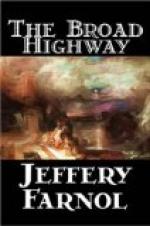For a space I stood dazed by the sudden light, and then, little by little, noticed that the table and chairs had been righted, that the fire had been mended, and that candles burned brightly upon the mantel. All this I saw but dimly, for there was a mist before my eyes; yet I was conscious that the girl had leapt up on my entrance, and now stood fronting me across the table.
“You!” said she, in a low, repressed voice—“you?”
Now, as she spoke, I saw the glitter of steel in her hand.
“Keep back!” she said, in the same subdued tone, “keep back—I warn you!” But I only leaned there against the door, even as she had done; indeed, I doubt if I could have moved just then, had I tried. And, as I stood thus, hanging my head, and not answering her, she stamped her foot suddenly, and laughed a short, fierce laugh.
“So—he has hurt you?” she cried; “you are all blood—it is running down your face—the Country Bumpkin has hurt you! Oh, I am glad! glad! glad!” and she laughed again. “I might have run away,” she went on mockingly, “but you see—I was prepared for you,” and she held up the knife, “prepared for you—and now—you are pale, and hurt, and faint—yes, you are faint—the Country Bumpkin has done his work well. I shall not need this, after all—see!” And she flung the knife upon the table.
“Yes—it is better—there,” said I, “and I think—madam—is —mistaken.”
“Mistaken?” she cried, with a sudden catch in her voice, “what —what do you mean?”
“That I—am—the Bumpkin!” said I.
Now, as I spoke, a black mist enveloped all things, my knees loosened suddenly, and stumbling forward, I sank into a chair. “I am—very—tired!” I sighed, and so, as it seemed, fell asleep.
CHAPTER IV
WHICH, AMONG OTHER MATTERS, HAS TO DO WITH BRUISES AND BANDAGES
She was on her knees beside me, bathing my battered face, talking all the while in a soft voice that I thought wonderfully sweet to hear.
“Poor boy!” she was saying, over and over again, “poor boy!” And after she had said it, perhaps a dozen times, I opened my eyes and looked at her.
“Madam, I am twenty-five!” said I. Hereupon, sponge in hand, she drew back and looked at me.
A wonderful face—low-browed, deep-eyed, full-lipped. The eyes were dark and swiftly changeful, and there was a subtle witchery in the slanting shadow of their lashes.
“Twenty-five!” she repeated, “can it really be?”
“Why not, madam?”
“So very young?”
“Why—” I began, greatly taken aback. “Indeed, I—that is—”
But here she laughed and then she sighed, and sighing, shook her head.
“Poor boy!” said she, “poor boy!” And, when I would have retorted, she stopped me with the sponge.
“Your mouth is cut,” said she, after a while, “and there is a great gash in your brow.”




